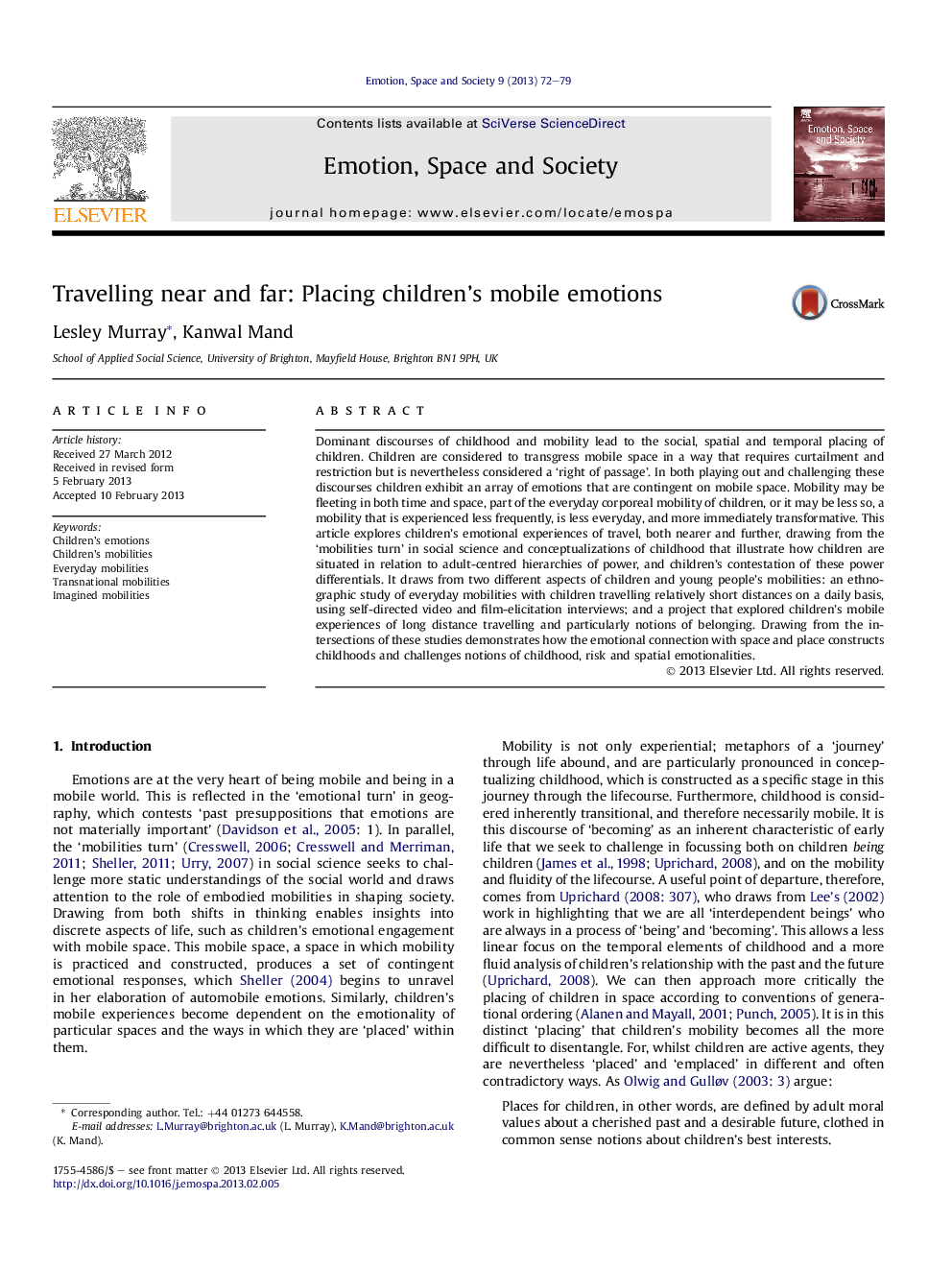| کد مقاله | کد نشریه | سال انتشار | مقاله انگلیسی | نسخه تمام متن |
|---|---|---|---|---|
| 7323461 | 1475638 | 2013 | 8 صفحه PDF | دانلود رایگان |
عنوان انگلیسی مقاله ISI
Travelling near and far: Placing children's mobile emotions
ترجمه فارسی عنوان
سفر به نزدیکی و دور: قرار دادن احساسات تلفن همراه کودکان
دانلود مقاله + سفارش ترجمه
دانلود مقاله ISI انگلیسی
رایگان برای ایرانیان
کلمات کلیدی
احساسات کودکان، توانایی های کودکان، توانایی های روزمره، توانایی های بین المللی، توانمندی های تصور شده،
ترجمه چکیده
گفتمان های متفاوتی از دوران کودکی و تحرک، منجر به قرارگیری کودکان اجتماعی، فضایی و زمانی می شود. کودکان در نظر گرفته می شوند که فضای موبایل را به نحوی که نیازمند محدودیت و محدودیت است، تجاوز کند، اما در عین حال "حق عبور" است. در این بازیگران و چالش برانگیز این کودکان، مجموعه ای از احساساتی را که در فضای موبایل دخیل هستند، نشان می دهد. تحرک ممکن است در هر دو زمان و فضا، بخشی از تحرک بدنی روزمره کودکان باشد، یا ممکن است کمتر باشد، تحرک که کم و بیش تجربه می شود، کمتر روزانه است و بلافاصله تغییر می یابد. این مقاله تجربه تجارب عاطفی کودکان در سفر، هر دو نزدیکتر و بیشتر، را بررسی می کند و از "حرکت های حرکتی" در علوم اجتماعی و مفهوم سازی دوران کودکی شکل می گیرد که نشان می دهد که چگونه کودکان در رابطه با سلسله مراتب قدرت متمرکز بر بزرگسالان قرار دارند و اختلاف نظر کودکان در این قدرت تفاوت ها آن را از دو جنبه مختلف از کودکان و نوجوانان محروم می کند: مطالعات قوم نگارانه از حرکت های روزمره با کودکان که به صورت روزانه به طور روزانه به مسافرت های نسبتا کوتاه می روند، با استفاده از مصاحبه های ویدئویی و فیلم سازی خودگردان؛ و یک پروژه که تجربه های تلفن همراه کودکان را در سفرهای طولانی و به ویژه مفاهیم متعلق به آن بررسی کرد. نقاشی از تقاطعات این مطالعات نشان می دهد که چگونه ارتباط عاطفی با فضا و محل، کودک و چالش را ایجاد می کند، تصورات دوران کودکی، ریسک و احساسات فضایی.
موضوعات مرتبط
علوم انسانی و اجتماعی
روانشناسی
روانشناسی اجتماعی
چکیده انگلیسی
Dominant discourses of childhood and mobility lead to the social, spatial and temporal placing of children. Children are considered to transgress mobile space in a way that requires curtailment and restriction but is nevertheless considered a 'right of passage'. In both playing out and challenging these discourses children exhibit an array of emotions that are contingent on mobile space. Mobility may be fleeting in both time and space, part of the everyday corporeal mobility of children, or it may be less so, a mobility that is experienced less frequently, is less everyday, and more immediately transformative. This article explores children's emotional experiences of travel, both nearer and further, drawing from the 'mobilities turn' in social science and conceptualizations of childhood that illustrate how children are situated in relation to adult-centred hierarchies of power, and children's contestation of these power differentials. It draws from two different aspects of children and young people's mobilities: an ethnographic study of everyday mobilities with children travelling relatively short distances on a daily basis, using self-directed video and film-elicitation interviews; and a project that explored children's mobile experiences of long distance travelling and particularly notions of belonging. Drawing from the intersections of these studies demonstrates how the emotional connection with space and place constructs childhoods and challenges notions of childhood, risk and spatial emotionalities.
ناشر
Database: Elsevier - ScienceDirect (ساینس دایرکت)
Journal: Emotion, Space and Society - Volume 9, November 2013, Pages 72-79
Journal: Emotion, Space and Society - Volume 9, November 2013, Pages 72-79
نویسندگان
Lesley Murray, Kanwal Mand,
